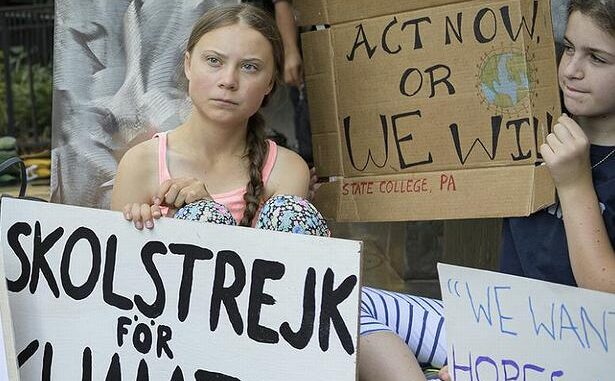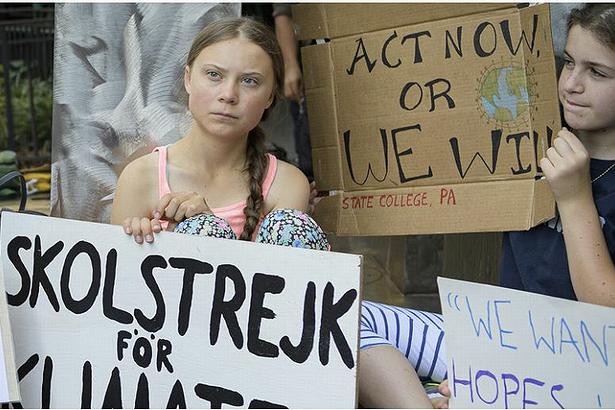
NEW YORK, New York, September 10, 2019 (ENS) – Teenage climate activist Greta Thunberg, author of the new book “No One Is Too Small to Make a Difference,” arrived in New York on August 28 after two weeks crossing the Atlantic on a carbon-neutral racing sailboat to take part in the UN Secretary General’s annual Climate Action Summit September 23. By sailing, she avoided the carbon emissions of air travel from her home in Sweden.
“The climate and ecological crisis is a global crisis and the biggest crisis humanity has ever faced,” Thunberg said shortly after disembarking at a Manhattan marina. “And if we don’t manage to work together and to cooperate … then we will fail.”

To show appreciation and solidarity for her mission toward a better world by 2030, the UN greeted the 16-year-old at the Verrazano Narrows Bridge with a flotilla of 17 sailboats, each representing one of the 17 Sustainable Development Goals on their sails.
Blaming “the older generation” for causing the “climate crisis,” she told a news conference at the marina that they “should not be saying to us ‘be a normal kid’ [because] we are just trying to clean up after them.”
Thunberg, who had just started ninth grade, launched her campaign for climate action last August when she sat outside the Swedish Parliament in Stockholm holding a sign saying, “Skolstrejk för Klimatet” [School Strike for Climate].
After the heat waves and wildfires of Sweden’s hottest summer in 262 years, Thunberg decided to not attend school and sit outside parliament until the 2018 Swedish general election on September 9. She demanded that the Swedish government reduce carbon emissions in accordance with the 2015 Paris Agreement on climate.
After the Swedish general elections, Thunberg continued her strike, but only on Fridays, calling it Fridays for Future. Attracting worldwide attention, she inspired students to stage their own strikes. As of December 2018, more than 20,000 students had held strikes in at least 270 cities, according to “The Guardian.”
During the past year, she has met with world leaders, helped organize a strike for climate action on March 15 that was joined by an estimated 1.6 million people in 133 countries; and was nominated for the 2019 Nobel Peace Prize.
Striking for Climate Across the World
Now Thunberg is helping to organize a week-long Global Climate Strike for September 20 through 27. Hosted by the nonprofit 350.org, with the participation of hundreds of civil society groups around the world, the strike is shaping up to be the largest climate mobilization in history.
350.org was founded in 2008 by a group of university friends in the United States along with author Bill McKibben, who wrote one of the first books on global warming for the general public, with the goal of building a global climate movement. The group named itself after 350 parts per million — the safe concentration of carbon dioxide in the atmosphere.

Today 350 works on grassroots campaigns across the world – from opposing coal plants and mega-pipelines to supporting renewable energy solutions and cutting financial ties of the fossil fuel industry.
This summer’s heat has been especially deadly. The July 2019 European heatwave set all-time high temperature records in Belgium, Germany, Luxembourg, the Netherlands, and the United Kingdom.
“This summer’s heatwave killed nearly 1,500 people in France alone,” said Clémence Dubois, a French campaigner with 350.org. “These are victims of fossil fuel financiers like the European Investment Bank, Total, and governments complicit in climate breakdown.”
“Investing in fossil fuels isn’t just morally reprehensible – it doesn’t make economic sense,” said Dubois. “The dirty energy sector is underperforming and is exposed to multiple transition risks.”
Kate Cahoon, a German campaigner with 350.org, is demanding that the world’s largest public lender, the European Investment Bank (EIB), stop financing fossil fuel projects from 2021. She says the governments of Germany and France are “key to delivering this vital policy,” but the German Federal Ministry of Finance is failing to back climate-friendly terms of lending for the bank.
Cahoon said, “It’s crucial that Olaf Scholz, Germany’s Federal Minister of Finance, climbs off the fence and seizes this opportunity to shift billions of euros away from dangerous fossil fuels. Starting on the 20th September millions of people will take to the streets to demand climate justice – there are hundreds of actions planned across Germany. By shifting finance from gas and coal to help develop community-scale renewable projects and energy efficiency this government could really help Europe to take the right path in the fight against climate change.”
UN Chief Welcomes Public Participation
Alarmed by the seriousness of the climate crisis, UN Secretary-General António Guterres is calling on all government leaders to come to his Climate Action Summit on September 23 with concrete, realistic plans to enhance their nationally determined contributions under the Paris Agreement on climate by 2020, in line with reducing greenhouse gas emissions by 45 percent over the next decade, and to net zero emissions by 2050.
In an opinion article on the UN’s Department of Economic and Social Affairs Sustainable Development Goals Blog September 3, titled, “Everything Has to Change for Our Planet to Stay the Same,” Secretary-General Guterres wrote, “Our planet is changing dramatically. Forests are burning, sea ice is shrinking and the Greenland icecap is pouring unprecedented amounts of water into the ocean. Levels of carbon dioxide in the atmosphere are higher than they have been in human history, climate disruption is the new reality, and scientists are warning that the planet is simply not capable of coping with the growing pressure being placed on it by humanity.”

Guterres, a former Portuguese Prime Minister, took the UN’s top job on January 1, 2017. Previously, he served as the UN High Commissioner for Refugees between 2005 and 2015.
“Since I became Secretary-General,” he blogged, “I have witnessed what it means to live in a world that is, on average, one degree Celsius hotter than it was before the industrial revolution. I have come to know the dramatic force of natural disasters supercharged by climate change.”
“I have seen families in the tiny Pacific archipelago of Tuvalu watching the sea creep closer and closer to their doorsteps. I have seen my own country, Portugal, mourn the deaths of over 100 people killed by forest fires during one of Europe’s hottest recorded summers. And I have seen children in Mozambique learning their ABCs in the scorching sun after the roof of their school had been swept away by Cyclone Idai, along with 90 percent of their city’s infrastructure. While there, I also visited a safe place for women in a displacement camp, which highlights the double jeopardy women face in times of disaster, where their losses are often compounded by vulnerability to violence,” wrote Guterres.
“The human suffering caused by the global climate emergency is already massive and growing daily, yet science tells us that it is nowhere near as calamitous as what our children will experience if we add another degree of global heating,” he wrote. “Science also tells us that we are currently on track to add a further two or more degrees within the lifespan of our grandchildren – a legacy of almost unfathomable ruin, and one we must do everything to avoid.”
Yet, Guterres wrote, “Despite the daily diet of grim news, there is still hope.”
“According to the Intergovernmental Panel on Climate Change, we can win the race against time that the climate crisis has become. But to do so, we must take transformative action now and implement ‘rapid, far-reaching and unprecedented changes in all aspects of society,’ around the globe,” Guterres wrote.
That’s why the UN chief wants “bold announcements from governments and businesses at the Climate Action Summit.”
“I am calling on countries to shift taxes from people to pollution, end fossil fuel subsidies and stop building new coal power plants by 2020. These are the first steps we must take to slow down runaway climate change before it breaches the most dangerous thresholds. We need to cut greenhouse emissions by 45 percent by 2030, and we need carbon neutrality by 2050,” Guterres stressed.
Young People Included as Never Before
To help world leaders raise their climate action ambitions, Thunberg is scheduled to speak during the Secretary-General’s Climate Action Summit.
On September 21, more than 500 young climate leaders have been selected to participate in the first-ever Youth Climate Summit at the UN Headquarters in New York.
In addition, the United Nations has chosen 100 outstanding young climate champions from around the world to receive support to participate in the UN Youth Climate Summit on Saturday, September 21.
The 100 Green Ticket winners will receive funded travel as carbon-neutral as possible to New York to attend the Youth Climate Summit. They were selected from a group of over 7,000 applicants between the ages of 18 to 29, based on their demonstrated commitment to addressing the climate crisis and advancing solutions. Recipients represent countries from all regions.
The Summit will provide a platform for young climate leaders to showcase their solutions on a global stage and engage directly with decision-makers on the defining issue of our time. Youth leaders will present the discussions of the Youth Climate Summit at the Climate Action Summit on Monday, September 23.
“Young people are leading the way on climate action,” said the Secretary-General’s Envoy on Youth, Jayathma Wickramanayake of Sri Lanka. “The Secretary-General’s Youth Climate Summit will provide a powerful global platform for young climate leaders from all over the world to take their rightful place and drive positive climate solutions.”
“I would love not to have to do this and just go to school,” Thunberg told reporters upon arriving in New York, “but…I want to make a difference.”
Copyright Environment News Service (ENS) 2019. All rights reserved.
© 2019, Environment News Service. All rights reserved. Content may be quoted only with proper attribution and a direct link to the original article. Full reproduction is prohibited.
